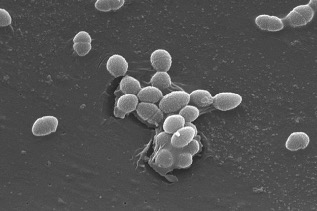
Figure 1: A scanning electron micrograph of Enterococcus faecalis, a bacterium that commonly resides in the human intestinal tract
Source: Wikimedia Commons
Over the last decade, gut-brain psychology has drawn much attention to the instrumental role of the gut microbiome in regulating brain development and function, including behavior and cognition (Liang et al., 2018). To better understand the mechanisms behind this connection, studies have largely focused on the relationship between microbiota composition and more extreme examples of brain dysfunction such as neurodevelopmental and mood disorders like autism and depression (Johnson, 2019). Much research on this topic asserts that gut dysbiosis (an altered microbiota composition) is indeed associated with several neurodevelopmental and mood disorders. Researchers have also proposed immune, endocrine, and neural pathways by which the gut microbiome influences behavior (Liang et al., 2018; Liu and Zhu, 2018; Fattorusso et al., 2019; Srikantha and Mohajeri, 2019).
Yet the literature is lacking in terms of the relationship between gut microbiome composition and milder differences in brain function that aren’t typically classified as neurological disorders (Johnson, 2019). For example, low sociability is associated with autism but is not a neurological disorder in and of itself. Rather, low sociability is a personality trait that is common throughout the human population.
In a recent paper, Dr. Katerina Johnson explains how she set out to address this knowledge gap by examining the association between microbiota composition and personality. By analyzing fecal samples with a technique called 16S rRNA sequencing that helps identify the different bacteria present, Johnson characterized the microbiomes of 655 adult participants. She then gathered their answers to the 50-item International Personality Item Pool, the State-Trait Anxiety Inventory, and the Autism Spectrum Quotient, as well as answers to a questionnaire surveying behavior, diet, health, lifestyle, and sociodemographics (Johnson, 2019). With this data in hand, Johnson measured the correlation between gut microbiota composition and diversity and traits such as sociability, neuroticism, social network size, and anxiety (Johnson, 2019).
The resulting data support Johnson’s hypothesis that the abundance of certain microbes, which have been elsewhere found to correlate with neurological disorders, can predict corresponding personality factors in adults without these conditions. For example, highly sociable participants hosted higher amounts of Akkermansia, Lactococcus, and Oscillospira, each of which have been negatively associated with autism in children or positively associated with sociability in mice (Johnson, 2019). Additionally, Desulfovibrio and Sutterella, which are abundant in individuals with autism, were negatively correlated with sociability (Johnson, 2019). Neurotic tendencies were negatively correlated with Streptococcus and Corynebacterium, the latter of which has been found to be reduced in mice with stress-induced depression, while the former has been found to be positively associated with depression; Johnson hypothesizes that this contradiction can be explained in that certain species of Streptococcus can be beneficial, while others can be pathogenic (2019).
In terms of microbial diversity, Johnson found that a diverse gut microbiome is positively correlated with social network size and hypothesizes that horizontal transmission (between socially interacting hosts) of microbes during socialization increases an individual’s microbiome diversity (2019). It has been proposed elsewhere that this association is explained evolutionarily from the perspective of the microbiota: certain microbes induce social behavior in the host to increase the chance of transmission and thereby the survival of the strain (Srikantha and Mohajeri, 2019).
Johnson’s results demonstrate that the correlation between microbiome composition and the symptoms of severe neurological disorders is to be found with corresponding personality traits in the general population as well. Even when participants with psychiatric conditions are excluded from the data, the majority of the findings still hold true (Johnson, 2019). Such concurrence between Johnson’s study and those examining the microbiome in relation to extreme neurological disorders might lend further support to the latter by extending correlations between microbiota and brain function to less severe expressions of traits and behaviors of interest. As Johnson notes, evidence suggests that autistic traits exist on a gradient across the population, and so neurological disorder-associated characteristics of the gut microbiota might be differentially detectable as well in a fashion correlating with degree of trait expression (2019). Future research to confirm this hypothesis is warranted by the preliminary support which Johnson’s study lends to it. Furthermore, if variation in the gut microbiota can be associated with brain functioning on a sliding scale, such findings might hold implications for the neurodiversity movement, which calls for recognition of neurological disorders as a phenotypic variant along a gradient, rather than a black-and-white disability (Tougaw, 2020).
References
Fattorusso, A., Di Genova, L., Dell’Isola, G. B., Mencaroni, E., & Esposito, S. (2019). Autism Spectrum Disorders and the Gut Microbiota. Nutrients, 11(3), 521. https://doi.org/10.3390/nu11030521
Johnson, K. V.-A. (2020). Gut microbiome composition and diversity are related to human personality traits | Elsevier Enhanced Reader. Human Microbiome Journal, 15. https://doi.org/10.1016/j.humic.2019.100069
Liang, S., Wu, X., & Jin, F. (2018). Gut-Brain Psychology: Rethinking Psychology From the Microbiota–Gut–Brain Axis. Frontiers in Integrative Neuroscience, 12. https://doi.org/10.3389/fnint.2018.00033
Liu, L., & Zhu, G. (2018). Gut–Brain Axis and Mood Disorder. Frontiers in Psychiatry, 9. https://doi.org/10.3389/fpsyt.2018.00223
Sandoiu, A. (2020, February 17). Can gut bacteria predict personality? Medical News Today. https://www.medicalnewstoday.com/articles/can-your-gut-bacteria-predict-your-personality
Srikantha, P., & Mohajeri, M. H. (2019). The Possible Role of the Microbiota-Gut-Brain-Axis in Autism Spectrum Disorder. International Journal of Molecular Sciences, 20(9), 2115. https://doi.org/10.3390/ijms20092115
Tougaw, J. (2020, April 18). Neurodiversity: The Movement. Psychology Today. https://www.psychologytoday.com/blog/the-elusive-brain/202004/neurodiversity-the-movement
Related Posts
Exposure to Ultraviolet Radiation Slows the Spread of COVID-19
Figure 1: Face masks are decontaminated using ultraviolet radiation. Biosafety...
Read MoreThe Role of Biometrics in Healthcare
This publication is in proud partnership with Project UNITY’s Catalyst...
Read MoreJillian Troth



